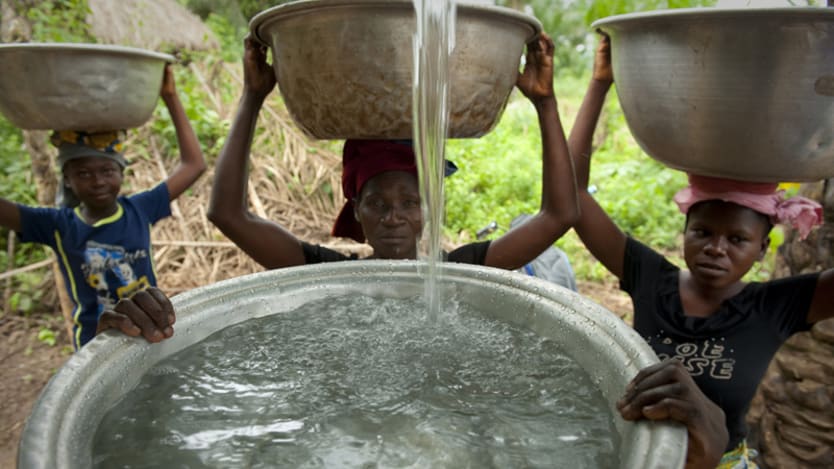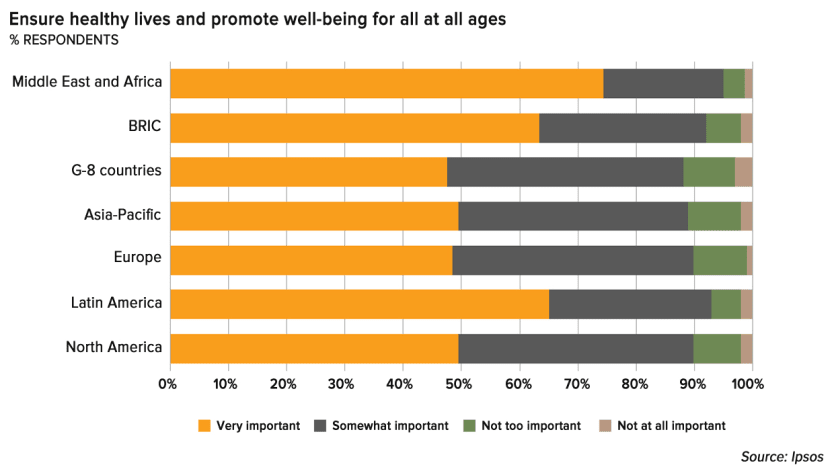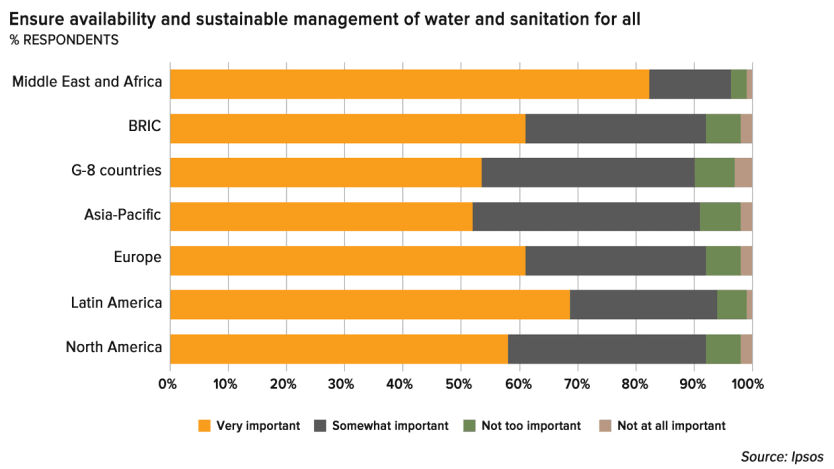
Better health, clean water and sanitation are covered in the third and sixth sustainable development goals that will be adopted by the U.N. General Assembly in September 2015. But while the SDGs have broadened the global agenda, health and water are covered in just two out of 17 goals — in the Millennium Development Goals, four of the eight goals targeted better health, water and sanitation. Does this mean that health, water and sanitation are de-emphasized?
In a recent survey conducted by Ipsos, a broad base of citizens in different countries was asked to prioritize each of the 17 SDGs. As you will see, health, water and sanitation remain important priorities for the public.

Overall, citizens consider the health SDG important. On average, 90 percent responded that they considered it either very or somewhat important. In reviewing the “very important” response only, however, regions with greater numbers of developing countries — Middle East and Africa, and Latin America — reported that health was very important at 74 and 65 percent respectively, while the lowest ratings for health as a very important priority were from Europe and the G-8 countries, tied at 48 percent.

Survey respondents generally considered water and sanitation important (92 percent) as well. In reviewing the “very important” response, the Middle East and Africa and Latin America reported that water and sanitation were very important at 82 and 68 percent respectively, while in the Asia-Pacific and the G-8 countries, only 52 and 54 percent of respondents respectively considered water and sanitation very important.
If we look at the past, our worse performance in the MDGs was in maternal, newborn and child health, and in reproductive health. So, why do we not get a 100 percent resounding “very important” rating for health, water and sanitation?
See more from this series:
► Rallying American support for foreign aid
► The SDGs: How will we know if we achieved them?
► Are the global goals within reach? When you invest in women, yes
► Supporting democracy in closing space
► The hard questions in education: Why and how?
► Where should #globaldev community focus aid to end hunger?
In a telephone conversation held Aug. 31, 2015, I asked Dr. Deborah Rugg, senior adviser to the U.S. Mission to the United Nations and former director of the Inspection and Evaluation Division at the United Nations, to offer her perspective on shifts in the SDGs. Rugg said that countries recognized during the MDGs that “development cannot be isolated; it is much more context-specific than we had thought.”
The SDGs emphasize partnerships, capacity strengthening and sustainability to complement technical solutions in interdependent development challenges. Rugg said she expects that, moving forward, we will be developing blended indicators that cover several areas at once. Thus, health is not de-emphasized, but seen as interrelated with other areas.
The Global Health Council agrees, suggesting that peace and stability (SDG-16) will have positive effects on the mental and physical health of communities, greater access to energy (SDG-7) will increase the services hospitals and community health centers can provide, and climate change (SDG-13) can change ecosystems to introduce or increase vector-borne diseases.
Ultimately, progress toward each and every SDG will contribute to better health for all; access to clean water and sanitation, just like better health for all will contribute to other sectors. As a global community, we figured out that HIV and AIDS is not only a health problem, but also a social, political, gender, culture and management challenge. As we work together toward SDG-3 and 6, we must rely on whole-systems approaches like quality improvement that enable links and coordination among services and different levels in the system, as well as integrate good management into health care.
Dr. Paul Batalden, who teaches leadership of health care quality improvement at the Institute for Health Care Improvement, said, “Every system is perfectly designed to get the results it gets.” If women will not see a male doctor in rural Pakistan, for example, training male doctors with the latest approaches will still only reach only half of the population — the men. To achieve the SDGs and get better health outcomes in a sustainable way, we are now asked to change the system. Systemic change requires multisector approaches (health, water, energy, transport, etc.) that work across sectors and at different levels of the system (individual, community, regional, etc.). Yes, we must continue to address medical challenges — better prevention, diagnostics and treatment — but also consider social norms and cultural practices, workforce preparedness and motivation, transport and supply chain issues, safety and access by women and other vulnerable people, education, media, technology, public-private partnerships, etc.
Finally, to achieve the SDGs, we must leave behind the “expert knows best” model, and embrace new approaches. In the U.S. Agency for International Development-funded Applying Science to Strengthen and Improve Systems, local experts are a key resource and enabler for success, and ministry leadership is seen as essential for building local capacity. The SDGs ask us to be humble, listen deeply, and forge mutually respectful partnerships between international and in-country development professionals.
We, international professionals, must find our place in the audience, and make room for local leaders on the stage. This is one of the key messages of Dr. Francis Omaswa, a global health leader from Uganda who served in his country’s government before working at the World Health Organization and later as the first director of the Global Fund to Fight AIDS, Tuberculosis and Malaria. In his blog posts at The Lancet, Omaswa continually sheds light on Africans solving Africa’s health problems. Let’s join Omaswa and others in a true development partnership and build a successful path toward the SDGs together.
Visit the Ipsos news center to see the data and other articles in this series. Join the Devex community and access more in-depth analysis, breaking news and business advice — and a host of other services — on international development, humanitarian aid and global health.








